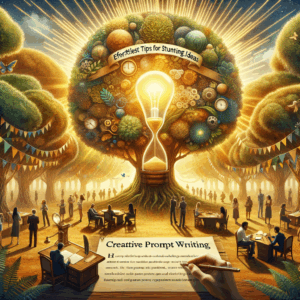
Best AI Prompts: Stunning Ideas For Effortless Creativity
- Understanding AI Prompts
- Types of AI Prompts
- Crafting Effective AI Prompts
- Examples of Stunning AI Prompts
- Storytelling Prompts
- Visual Art Prompts
- Marketing Prompts
- Brainstorming Prompts
- Educational Prompts
- How AI Generates Content from Prompts
- Benefits of Using AI Prompts
- Enhanced Creativity
- Time Efficiency
- Flexibility
- Overcoming Writer’s Block
- Cost-Effective
- Challenges of Using AI Prompts
- Dependence on AI
- Quality Control
- Ethical Considerations
- Misinterpretation of Context
- Limited Emotional Depth
- Future of AI Prompts in Creativity
- Conclusion
- FAQs
- References
Understanding AI Prompts
In the digital age, creativity often intertwines with technology. Artificial Intelligence (AI) empowers creators, writers, and artists to explore fresh ideas effortlessly. At the core of this is the concept of AI prompts. These prompts guide AI tools, allowing them to generate amazing content tailored to your needs. Whether you’re crafting a story, designing an art piece, or brainstorming marketing strategies, the right prompts can spark incredible creativity.
Why are AI prompts so essential? They can streamline your thinking process, offering structure and inspiration. For instance, instead of staring at a blank page, you can input specific prompts and watch the magic unfold. Moreover, with AI’s ability to interpret vast amounts of information, it can help you access nuances and angles that you might not have considered. This results in a richer creative output.
Types of AI Prompts
Understanding the various categories of AI prompts can help you leverage their potential. Here are several types:
1. Storytelling Prompts: These often take the form of scenarios or character descriptions. They ignite narrative ideas.
2. Visual Art Prompts: These prompts focus on themes, styles, or color palettes, helping artists convey emotion through visuals.
3. Marketing Prompts: Marketers use these to generate catchy headlines, social media posts, or advertising scripts.
4. Brainstorming Prompts: Designed to inspire new ideas across any field, they support innovation.
5. Educational Prompts: These guide tutoring sessions or study plans, offering explanations or creative ways to engage students.
Identifying the right type of prompt for your project makes a significant difference. Each category has unique characteristics that cater to specific needs.
Crafting Effective AI Prompts
While it may seem simple to generate prompts, crafting effective ones requires thoughtfulness. Start by considering what you want to achieve. Clear, concise prompts yield concise responses. Here are some tips for crafting effective prompts:
– Be Specific: Specify the details you want. For instance, instead of asking for “a story,” ask for “a fantasy story about a dragon and a brave knight.”
– Include Context: Provide background information to help the AI align with your vision.
– Limit Scope: Narrow the focus of the prompt. Instead of asking for “ideas,” ask for “three creative marketing ideas for a new coffee shop.”
– Utilize Open-Ended Questions: Questions that invite elaboration lead to richer information.
Using these strategies enables you to guide AI more effectively, ensuring it meets your creative needs.
Examples of Stunning AI Prompts
Let’s explore some compelling examples across different domains. These prompts serve as inspiration but can also be a launching point for your creativity.
Storytelling Prompts
1. “Write a story about a time traveler who meets their younger self.”
2. “Describe a world where dreams come to life, and the challenges it presents.”
3. “Craft a mystery involving an ancient artifact found in a modern city.”
Visual Art Prompts
1. “Create an artwork depicting hope using only blue and yellow hues.”
2. “Illustrate a scene from a winter fantasy landscape.”
3. “Develop a mural that combines elements of nature and technology.”
Marketing Prompts
1. “Generate three catchy slogans for an eco-friendly cleaning product.”
2. “Write a social media post promoting a virtual event for yoga enthusiasts.”
3. “Develop an email marketing campaign for a new fitness app.”
Brainstorming Prompts
1. “List five innovative solutions for reducing plastic waste.”
2. “Think of three ways to improve employee engagement in remote teams.”
3. “Identify six potential niches for a new podcast.”
Educational Prompts
1. “Outline a lesson plan to teach fifth graders about renewable energy.”
2. “Create quiz questions for a unit on the American Revolution.”
3. “Devise a presentation that encourages students to explore science careers.”
Such prompts serve not only to ease the creative process but also to broaden one’s perspective.
How AI Generates Content from Prompts
The process is fascinating. AI systems, like language models, utilize vast datasets to understand context, meaning, and stylistic preferences. When you input a prompt, the model parses your words, analyzes patterns, and formulates a coherent response.
AI uses machine learning algorithms to predict what comes next in a sentence or concept based on existing information. This predictive capability flows from countless examples it has encountered, allowing it to emulate various writing styles, tones, and genres.
Moreover, AI can generate variations of the same prompt, offering diversity in tone and style. This ensures that even with similar prompts, the response can vary significantly. You receive tailored suggestions that resonate with your preferences.
Benefits of Using AI Prompts
Using AI prompts offers several advantages. Here are some key benefits:
Enhanced Creativity
AI prompts push boundaries. They encourage exploration outside your normal thought patterns. As a result, you may discover new ideas that excite you. This exploration fosters a creative environment where innovation can flourish.
Time Efficiency
Generating ideas can be time-consuming. AI assists in speeding up this process. Instead of laboring over starting points, you quickly receive suggestions, allowing you to focus on refining those ideas into outputs.
Flexibility
AI tools can adapt to various formats. Whether you need a blog post, a marketing strategy, or an art concept, prompts can flexibly cater to your specific needs. This multifunctionality makes them valuable across industries.
Overcoming Writer’s Block
Have you ever stared at a blank page for hours? AI prompts can break this cycle. They provide the nudge you need to get started. By generating content segments, they can help you overcome those frustrating periods of writer’s block.
Cost-Effective
Many AI tools are affordable or even free. This advantage allows individuals and small businesses to access creative resources without significant investment. Utilizing such tools can lead to high-quality output at a fraction of traditional costs.
Challenges of Using AI Prompts
While AI prompts have various benefits, they also come with challenges worth considering. Understanding these can lead to more effective use.
Dependence on AI
Reliance on AI can hinder original thought. Users may become so dependent on prompts that their creativity stagnates. It’s essential to balance AI assistance with personal creativity to maintain authenticity.
Quality Control
AI-generated content may lack the human touch. While AI can produce coherent outputs, the quality can vary significantly. Always review and edit AI suggestions to align with your brand voice and desired quality.
Ethical Considerations
AI raises questions about originality and attribution. In educational contexts, reliance on AI could lead to plagiarism concerns. Users must be mindful of these ethical implications when employing AI tools.
Misinterpretation of Context
Sometimes, AI misinterprets nuances and context. An ambiguous prompt may lead to unexpected or irrelevant responses. Clarity in prompt crafting becomes essential to mitigate this risk.
Limited Emotional Depth
AI lacks genuine emotional understanding. While it can mimic emotions based on patterns, it cannot feel them. Content that needs authentic emotional resonance requires a human touch for true impact.
Future of AI Prompts in Creativity
The future of AI prompts promises exciting developments. As technology advances, we can expect more sophisticated AI tools. These will improve understanding, making them even more adept at interpreting prompts.
Moreover, AI will likely become more customizable. This means users may be able to set parameters or even “train” AI on their styles. Such capabilities will foster deeper creative collaborations between humans and machines.
Additionally, as AI tools proliferate, the accessibility of creative resources will further increase. This democratization of content creation will empower individuals and industries alike. As we embrace these advancements, it opens doors for more diverse voices and innovative ideas.
Conclusion
AI prompts serve as an invaluable tool in today’s creative landscape. They streamline idea generation and offer a canvas for exploration without the pressure of perfection. By understanding how to effectively craft and use prompts, you can elevate your creative output, whether in writing, marketing, or art.
Incorporating AI prompts in your routine invites new possibilities. The fusion of human creativity with AI assistance can lead to breathtaking results. Embrace the journey and discover how these stunning ideas can transform your creative process.
FAQs
1. What are AI prompts?
AI prompts are inputs given to AI systems that guide them in generating content or ideas.
2. How do I come up with good AI prompts?
Be specific, provide context, and limit the scope. Open-ended questions also invite richer responses.
3. Can AI replace human creativity?
AI can support creativity but can’t fully replace the originality and emotional depth of human thought.
4. How do I ensure the quality of AI-generated content?
Always review and edit the content to align it with your preferred voice and quality standards.
5. Are there ethical concerns with using AI prompts?
Yes, issues like plagiarism, originality, and emotional authenticity should be considered when using AI.
6. Can AI prompts be used for marketing?
Absolutely! AI prompts can generate catchy slogans, social media posts, and more.
7. How can AI help with writer’s block?
AI prompts can provide starting points or fresh ideas that lead to overcoming creative stagnation.
8. What are the challenges of using AI prompts?
Challenges include potential dependence, quality control, ethical concerns, and misinterpretation of context.
9. What is the future of AI prompts?
As technology advances, AI prompts will become more sophisticated, customizable, and accessible.
10. Where can I find AI prompt generators?
There are many online tools and platforms, such as OpenAI, that offer AI prompt generation.
References
– OpenAI. (2023). _Introducing ChatGPT_. Retrieved from OpenAI
– Gartner. (2023). _Top Trends in AI_. Retrieved from Gartner
– Forbes. (2023). _AI and the Future of Creativity_. Retrieved from Forbes
– HubSpot. (2023). _The Role of AI in Content Marketing_. Retrieved from HubSpot

